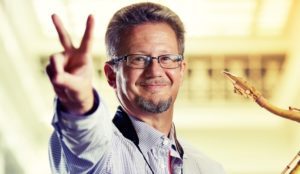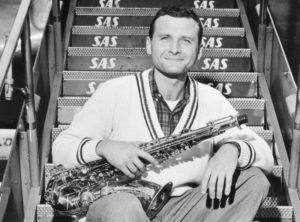Don Aliquo Presents “Tribute to Stan Getz” at the Frist
A temperate spring day drew Nashville locals and tourists to mill about downtown, filling the streets with party buses, pedal taverns, strolling pedestrians, and others riding motorized scooters. As always, the Frist Art Museum was a popular destination for the public who were entreated to another installment of the Nashville Jazz Workshop’s Jazz on the Move series on April 14.
The presentation, titled “Tribute to Stan Getz” was led by saxophonist Don Aliquo who is Professor of Saxophone and Jazz Studies at Middle Tennessee State

University. This was the final installment of the series for 2019, and it featured pianist Lori Mechem, bassist Roger Spencer, drummer Duffy Jackson, guitarist Mel Deal, and saxophonists Denis Solee, Kyle Etges, and Zach Tyler in the ensemble through various configurations. The group performed selections from tenor saxophonist Stan Getz’ wide and varied repertoire spanning from the late 1940s to the mid-1980s. As with other presentations in the Jazz on the Move series, the auditorium at the Frist Art Museum was fully attended with every seat filled.
The presentation opened with welcoming remarks from Ellen Pryor, Director of Communications at the Frist and Eric Dilts, Executive Director of the Nashville Jazz Workshop. After the welcoming remarks were concluded, the group launched into a swinging rendition of “Four Brothers,” a Jimmy Giuffre tune recorded by the second Woody Herman “Herd” big band that first exposed Getz’ playing to a wider audience. Incidentally, the second “Herd” was also known as the “Four Brothers Band” due to the popularity of Giuffre’s composition. This tune featured all four saxophonists playing a harmonized melody, often referred to as a “sax soli” feature. The unique aspect of this piece, which was an essential characteristic of Herman’s “Four Brothers Band” was the instrumentation of the saxophone section: three tenors and one baritone saxophone as opposed to the standard instrumentation of two altos, two tenors, and one baritone. The tenors, comprised of Aliquo, Solee, and Tyler with Etges on baritone played with striking precision on the complex melody of the song characterized by the bebop stylings that had emerged in the 1940s when the song was first recorded.
During the improvisations, each saxophonist played with a style reminiscent of Getz’

sound during this period, which was largely modeled after acclaimed saxophonist Lester Young. The overall sound was characterized by smooth phrasing that remained adherent to the pocket provided by the rhythm section.
Speaking of the rhythm section, Mechem, Deal, Spencer, and Jackson supported the wind players superbly with a finely-tuned balance of musical interjection and accompaniment. This resulted in troves of compelling textures, timbres, and atmosphere when combined with the wind players. Jackson proved to be the fieriest of the group, alternating steady swing and Latin grooves with plenty of comping to spare. Each rhythm section member took thoughtful, tasteful, and compelling solos that showcased their depth of knowledge through years of experience of being in-demand jazz musicians in both Nashville and beyond.
After “Four Brothers,” Etges and Tyler exited the stage and the rest of the group moved through the next selections with Aliquo and Solee taking turns on various melodies of the tunes that followed. These selections included a mixture of ballads like “Early Autumn” and “Moonlight in Vermont” (featuring a chord melody introduction by Deal) with up-tempo bebop tunes like “Motion” (a contrafact of “You Stepped Out of a Dream”) before moving into the Latin staples of Getz’ career. These Latin selections included “Desfinado,” “The Girl from Ipanema,” and the bebop/Latin hybrid “Con Alma.” The final selection performed was “Voyage,” an up-tempo tune written by pianist Kenny Barron that appeared on Getz’ album of the same name in the mid-1980s. Both Aliquo and Solee played stylistically true to Getz’ sound while maintaining their own musical identity throughout their phrases, often carrying musical conversations on both the original melodies and improvised solos.
The presentation given by Aliquo and his supporting group largely featured playing the musical selections interspersed with minimal remarks by the artists on Sunday afternoon. It was an effective approach to let the presentation unfold primarily through the music rather than the use of anecdotes. Aliquo provided concise, meaningful information in the spoken parts, and he kept the audience entertained with humor and interactive questions, asking for the audience to describe aspects of Getz’ trademark sound at one point during the presentation.
Readers are encouraged to check out upcoming events at the Nashville Jazz Workshop at their website www.nashvillejazz.org and Aliquo’s upcoming projects via www.donaliquo.com.
- About the Author
- Latest Posts
Originally from Missouri /məˈzɝ.ə/, Derek has been living in the middle-TN area since Fall 2015. After completing a Master of Music degree in Jazz Studies from Middle Tennessee State University in Spring 2017, he has remained an active jazz guitarist, arranger, and educator in the Nashville area with positions at MTSU, Motlow State Community College, and a robust private studio. When not practicing or writing, you can usually find him reading Chesterton at the local coffee shop.



